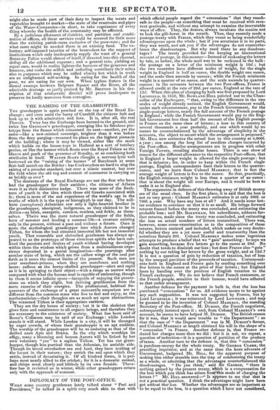THE RAISING OF THE GRASSHOPPER.
THE grasshopper is again perched on the top of the Royal Ex- change ; and even amid the hurry of Cornhill the citizens halt and look up to it with admiration and love. It is, after all, the real Phoenix. Twice has the Exchange been burned to the ground, and twice has GRESHAM'S grasshopper, emerging like its fabulous pro- totype from the flames which consumed its nest—another, yet the same—like a new-minted sovereign, brighter than it was before from the fiery purging—resumed its place on the highest pinnacle of the building ; where it may be viewed, either like the stork which builds on the house-tops in Holland as a sort of tutelary genius, or like the banner which floats over the Royal Palace as the blazon and park of the presence of Royalty, or as combining both attributes in itself. WALTER SCOTT thought a nervous lyric well bestowed on the "raising of the banner " of Buccleuch at some foot-ball match on the Border : has Cockneydom no bard to sing the raising of a prouder standard, not over a mimic contest, but over the field where the old tug and contest of commerce is carrying on as briskly as ever? The denizens of the Royal Exchange are not the first who have had the grasshopper for their emblem ; the citizens of Athens wore it as their distinctive badge. There was more of the fresh-
ness of youth in the idea which those old Greeks associated with it; there is more of the sad experience of the world's age in the
truths of which it is the type or hieroglyph in our day. The soil- born (avroxgovss) Athenians saw only a light-hearted brother in the grasshopper, aboriginal, indigenous, as they claimed to be in Attica—as brisk, energetic, careless, restless, and fickle, as them- selves. Theirs was the mere natural grasshopper of the fields, born of summer and leading a summer-life—a creature existing only in the present, without a past and without a future. Ours is more the mythological grasshopper into which Aurora changed Tithon, for whom she bad obtained immortal life but not immortal youth. That venerable and shrivelled gentleman has always ap- peared tq us the prototype of those vivacious spirits who have out- lived the passions and desires of youth without having developed within them the wisdom which grows from a multitudinous expe- rience deposited in a genial imagination—the yearnings after another state of being, which are the callow wings of the soul put forth as it nears the utmost limits of the present. Such men are your merchant-princes, when they are merchants and nothing more: callous as the horny-shelled grasshopper—alert and rapid as it is in springing to their object—with a range as narrow when compared with what the human soul is capable of embracing, though to them it seems infinite space—incapable of enjoying the posses- sions on which they alight, but deriving gratification from the mere exercise of their energies. The professional, habitual fre- quenters of the exchange of a great mercantile emporium are as different from the common mass who live to feel and enjoy, as the mathematician—their thoughts are as much set upon abstractions. The wizzened Tithon is their appropriate emblem. They are the dry bones of society ; but it is the skeleton that gives form and consistence to all organic beings, and therefore they are necessary to the existence of society. What has been said of Rome's Coliseum may be said of our Exchange : while London stands it will stand. While London is a city, it will be thronged
by eager crowds, of whom their grasshopper is an apt emblem. The worship of the grasshopper will be as enduring as that of the deified oxen Apia and Brama. In the city which worships its effigy, many a blooming and buxom Aurora will be linked by her own voluntary " yes " to a sapless Tithon. Yet has our grass- hopper, though less poetical than the Athenian, its amiable side. Though its brood overshadow sea and land, they have nothing of the locust in their nature; they enrich the soil upon which they settle, instead of devastating it. Of all kindred forms, it is per- haps most nearly allied to the cricket ; for it is a domestic animal, and chirps most clearly and blithely by its own fireside. There- fore has it revisited us in winter, while other grasshoppers return only with the approach of summer.






























 Previous page
Previous page